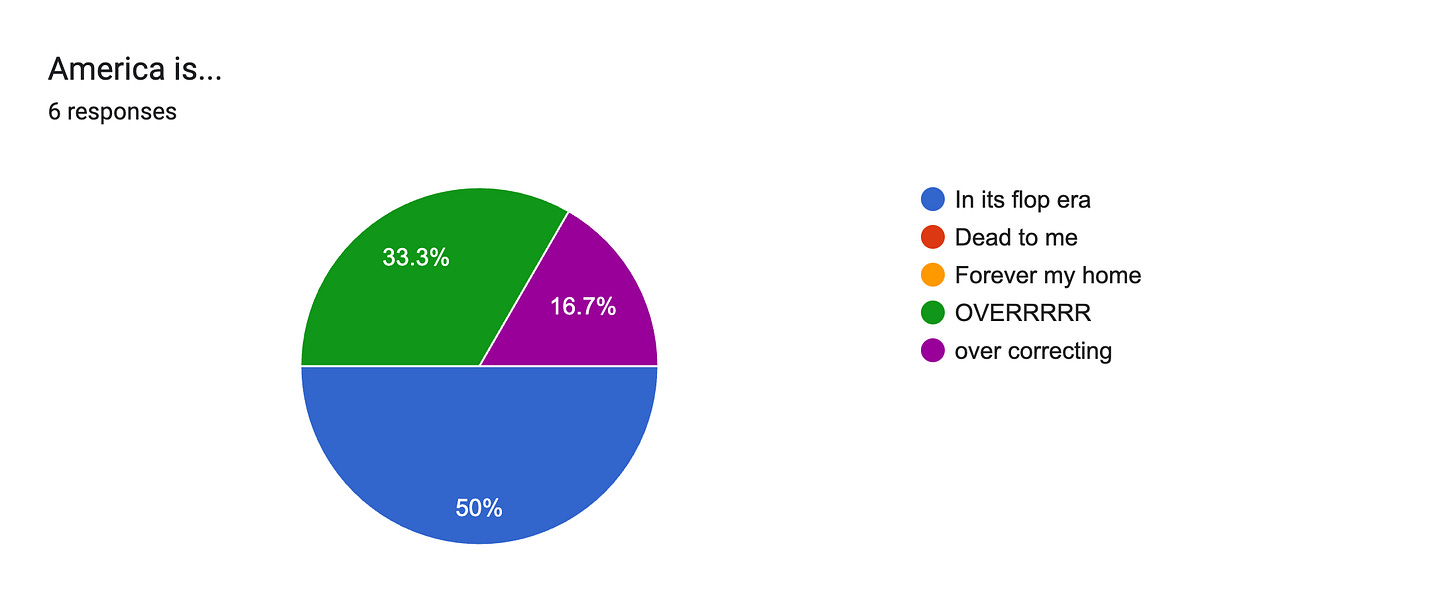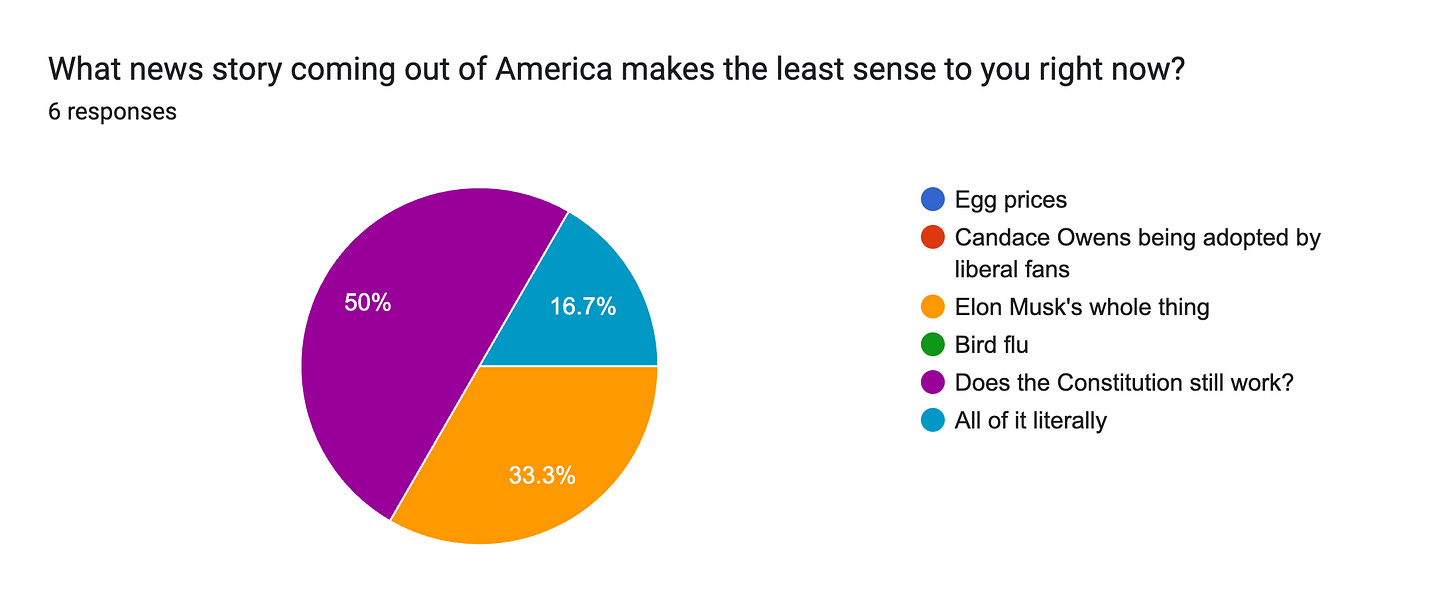Living, Laughing, Leaving America
You can check out any time you like, but you can never leave our never-ending news cycle
I wanted to start today’s piece with some of my current thoughts on citizenship, community, what we’re all supposed to be fighting for, and, perhaps more importantly, what we’re all supposed to be fighting against. I don’t know most of today’s panel participants, so it is best practice to clarify that this is how I’ve been feeling lately and not necessarily a message co-signed by my guests.
Now, I have made it abundantly obvious here on E4P where I stand on issues regarding belonging in America. I think the way we talk about immigration, writ large, is dark-sided, and it does not make sense why we as a country have done so little since, at the very least, the rise of birtherism to combat false narratives around who comes to this country, as well as when, how, and why. We have let the most disgustingly hateful people control this conversation, and it is now starting to eat away at all of our rights.
Make no mistake: the first groups and individuals that this administration has detained and deported were chosen intentionally. The Venezuelan men who were deported and marched into the Terrorism Confinement Center (or Cecot) in a uniformed manner crafted an image to support the Trump Administration’s allegations that they are all violent gang members. However, whether or not they are is not the central issue here: the lack of a free and fair trial to determine their criminality and legal status is. The Constitution states that everyone, regardless of their immigration status, has the right to due process.
The students we’re hearing about who have been targeted for their involvement in pro-Palestinian activism have been, by and large, green card holders or here on student visas—in other words, people whose legal statuses could be questioned or easily revoked. While your personal opinions on Israel, Palestine, and the past year and a half of immeasurable loss, violence, and suffering are not the central issue of this matter, it is clear that the administration is hoping for people to question others’ concern over these detainments.
This administration and Kristi Noem’s sentient hair extensions is banking on the fact that some Americans will root for these developments. But they are also hoping for some of us to let our hang-ups keep us from properly understanding that if our government can do this to legal residents, students, human people who differ from Trump in any way, they can and will find a way to come for all of us. These are active violations of the Constitution—if we let them get away with this, if we turn our heads, if we say, “Yes, this is bad, but…” the rules will cease to apply.
Again, these are my thoughts as this is my newsletter; I have my biases and beliefs, just as you all have yours. I’m not asking you to change your life or worldview, but I would be remiss not to end with this quote, especially since The Hunger Games are once again en vogue: Remember who the real enemy is.
After all that word vomit, today’s piece is, in many ways, an extension of our conversation with Avery last Monday. This week, I spoke with six individuals who have left the US about their experiences living abroad and their perceptions of America today. I am so grateful they felt comfortable getting so personal in a stranger’s Google form because it resulted in a fascinating piece.
Where in the world are you currently living, and how did you end up there?
Anon, he/him: London. I moved there for a combination of professional opportunities and being closer to my parents, who live in Europe.
KB, 32, she/her: London! I left a decade-long relationship and wanted a fresh start. Plus, I always felt really pulled here, energetically.
Jon, 31, he/him: London. I moved here for a relationship in 2017. The relationship ended, but I fell in love with London and never wanted to leave.
SS, 32, her/she: London. I always wanted to move to London after graduating from university. Came here through work.
MS, she/her: Living in Germany. My now-husband and I met in high school during a semester abroad I did in 11th grade. We stayed in touch over the years and started dating seriously after college. He couldn't get a visa to come to the US, so I took the leap at 23 and moved over here with work. And I'm sure glad I did!!
Cassidy, 30, she/her: I live in London currently. I had a summer internship here in 2015, and decided then and there that I'd have to make my way back at some point. It took a bit longer than planned...I had a few different jobs in New York, some rogue r*lationships, and a whole ass pandemic! But the stars finally aligned in 2022, and I found a job opportunity that I was absolutely stoked to take.
What made you decide to leave America, and would you ever come back permanently?
Anon: I left because I wanted to experience a new culture and something different. I would return to the US permanently, but only if the economy continues to be stronger than the rest of the world. Salaries are significantly lower in Europe vs the US.
KB: I wanted adventure, to spend every day a bit out of my comfort zone, and to challenge myself. I probably will not come back.
Jon: NEVER. I left for personal reasons, following a relationship, but the choices being made in the country have ensured that I have no plans on returning. Equally, after 8 years, and finding a new relationship, my life is here in the UK, so I wouldn’t want to uproot again.
SS: I always wanted to do a stint in the UK, but now that I’m a bit more settled here, it is unlikely that I’d move back permanently in the near future.
MS: I knew I wanted to give our relationship a serious chance after dating long distance for two years. I thought, best case scenario, this works out and he's the one. Worst case, I get some work experience abroad and come home. Turns out it was best case!! We have thought about moving back for a couple of years, but I definitely cannot imagine moving back to the US permanently and indefinitely.
Cassidy: For as long as I can remember, I wanted to leave. Like, I even picked my college specifically for the study-abroad programs, so that I could start laying foundations to GTFO. I've always felt like the world is so much bigger than America, despite the efforts to teach us otherwise. I'm the kid of immigrants who criss-crossed the Atlantic over the last hundred years, so I figured it was worth trying myself.
That being said—no, I won't be crossing it back anytime soon. :)
As an American, do you ever get made fun of, especially with this new administration?
Anon: I wouldn’t say made fun of, but I do carry some shame for the policies of the US government.
KB: Not really made fun of, more met with pity and concern.
Jon: Yes
SS: No—likely because I also don’t agree with the administration's policies and how they are moving.
MS: When I first moved here almost 10 years ago, I actually got made fun of more than I do now. Back then, I was meeting a lot of new people and Germans are VERY direct—a lot of them didn't personally know any Americans, and they would joke to me about how uneducated, uninformed, loud, and generally uncool Americans are.
Now I have an established group of friends, so no one "makes fun" of me for being American as such. In general, I feel most people here aren't "making fun" of Americans—that feels too light-hearted. People in my circle now talk all the time about how deeply concerned they are about the path the country is going down and how we struggle to understand what motivates certain groups to behave the way they do.
Cassidy: ALL THE TIME. Living in the UK, it's such a piss-take culture anyway, but being American in particular is just jet fuel for it. And of course, every country has stereotypes, but as a culture on the whole, we really have NAWT made a good name for ourselves on the world stage, and people like to bring that up. A lot. Especially in today's climate.
Follow up: is there a particular stereotype people have about Americans that has stuck with you for any reason?
Anon: No specific stereotype. Mostly things around guns and healthcare.
KB: I came here expecting to find the American stereotypes grating and assumed I’d want to distance myself from them. But I’ve actually experienced the opposite—I’ve come to appreciate the parts of those stereotypes that I embody: genuine optimism, a strong work ethic, being extra friendly, and finding it easy to connect with others.
Living abroad has made me see American culture in a new light, and I’ve grown to really value the energy, openness, and sense of possibility that comes with it.
Jon: A lot of people have a stereotype that Americans are friendly, which is great. But they also believe that the average American is stupid…I tend not to disagree with that.
SS: Nothing specific comes to mind.
MS: A big stereotype I hear still is, "In America they do this," and it will be some really specific or regional thing. Like, "In America everyone is super religious and doesn't have sex before marriage," or "In America people eat fast food every day"—YES, in some places.
I think Europeans don't realize how big the US is, and that the difference between metro and rural areas is huge. Which is ironic, because even in Europe, there's a huge cultural difference between metro and rural areas.
Cassidy: I have a memory of being out to dinner with friends right after I moved. They were talking about another American being annoying or something, and one of them turns to me and goes, “Don't worry, you're the perfect level of American.” And I was like, huh?????
Now, after living here for a few years...I kinda get it, which is why it's always stuck with me. We do tend to just be a bit over-the-top in our existence, and now I can clock it immediately in others and in myself, honestly.
What is it like to watch news come out of America from abroad?
Anon: It’s the worst part of my morning.
KB: Living abroad has reinforced my belief that movement, the exchange of ideas, the discomfort of the new, and diversity are what truly fuel progress and positive change. It’s deepened my appreciation for how valuable immigration and cross-cultural experiences are—not just for individuals, but for society as a whole.
Jon: Horrifying and bewildering.
SS: Terrifying.
MS: I have to hype myself up to watch. It is scary and makes me feel powerless. Sometimes it feels like I'm watching an SNL skit, honestly. I think we will look back on this time in 50 years and say, “That was the beginning of the end.”
Cassidy: Strange. It's like hearing about chaos and dysfunction in Bachelor Nation after being a lifelong fan who hasn't watched in several seasons. There's so much time invested and a deep sense of care, and you KNOW the lore, but also now I have a sense of distance and a lack of familiarity with where things are nowadays, like how day-to-day life actually feels there right now. So it's all a bit hard to wrap my head around.
Has your experience living abroad changed, influenced, or added anything to your understanding of how immigration is viewed in America?
Anon: I go both ways on this. I’m incredibly fortunate to have had corporate sponsorship for being able to live and work in the UK. Immigration is an important part of each country's culture and economy. In general, I’m pro-immigration when it does not come at the expense of a local population, i.e., prices increasing, crime, etc.
KB: I think everyone—no matter where they’re from—should spend at least a year living abroad. It’s the best decision I’ve ever made. It’s pushed me to become more self-reliant, curious, and confident in ways I never expected. Living in a new country challenges you, but it also opens you up to new perspectives, new people, and a deeper understanding of yourself and the world.
So if you’re considering it, just do it. It will enrich your life in ways you can’t predict!
Jon: Absolutely. I’ve just applied for my British passport, and it was so much clearer than the US immigration system. We have our own issues with refugees and asylum seekers, but at least we’re not sending them to El Salvadoran prisons with no due process.
SS: Watching this unfold from abroad, as an immigrant to America, has been horrifying. Immigration always needed work, but this administration has taken it to the extreme in a way that’s inhumane in my view.
Cassidy: Absolutely. Seeing how other countries view immigration has actually reframed the American approach to it. But honestly, that approach is changing in front of us in real time, so I actually don't think I can answer this right now.
What advice do you have for anyone considering emigrating from America, if any?
Anon: You can’t keep the same lifestyle. There will be many differences, and you need to embrace those differences. I would also think long and hard about whether the sacrifice in income is worth leaving.
Jon: If you can afford it, the easiest way to get a visa is to become a student again—you can then usually find work and convert that into sponsorship. Second piece of advice, JUST DO IT.
SS: Consider your financial situation.
Cassidy: Leaving doesn't fix all of life's problems. Work is still work. People are still people. Rent is still too damn high!!
But, when you're in a physical place with spaces that you enjoy and people that you love, and you're able to just feel more like YOU, it makes all that shit a lot easier to handle.
Is there anything else you'd like to add?
SS: America’s trade war with the world is a bad move for the economy, and I fear that that’s what the country needs to see how insane the first few months of this administration have been. Also, these Signal messages…how is that okay?
MS: The entire time I lived here in Germany, I've LOVED going home and always missed SO much about the US. I always love being in the US, like I could recharge. And I've always missed more than just my family and friends, but the culture, the lifestyle, the attitude of people, the openness, and friendliness.
Now, it breaks my heart that every time I go back to the US, it feels a little bit more unrecognizable. The country I grew up in feels like it's gone.
Cassidy: I'd like to clock the tea on 'expat' versus 'immigrant' as labels for us foreigners...that's all.1
What is one thing you miss about America that you have yet to find anywhere else in the world?
Anon: Good Mexican food. The community I had growing up. Trader Joe’s. In-N-Out. Financial incentives for businesses.
KB: Honestly, other than my family and a few places that hold personal meaning, there’s nothing I really miss about America. I’ve built a life I love in London, and I don’t feel a strong pull toward anything back home beyond the people and memories that matter to me.
Jon: Buttermilk biscuits.
SS: Salary potential is a lot greater coming from New York City!
MS: Americans are great at convenience, so it's not one thing but so many small things I miss. Ice cube dispensers in fridges, parking spaces that don't require 12-point turns to get into, as much as I hate to say it, superstores like Target where I can get craft supplies, a new lamp, and ingredients for dinner in one go. Little things that make life a little easier!
Cassidy: The food. I'll say it. Don't come for me on the “additives” and “added sugars” and blah blah blah. SORRY, but nowhere in the world has food like New York City. Is New York America, though? Perhaps for a different newsletter...
Thank you so unbelievably much to Cassidy for brain-childing this idea and sending it around to today’s participants!!! And thank you to today’s participants for responding with such insightful and personal experiences!!!!
Funny enough, I had a conversation about this with someone outside of this panel, and looked into whether there is an actual difference that would make someone an “expat” versus an “immigrant,” or if it’s just a social construct. In short, it’s technically both: “expat” has commonly been used to refer to someone living out of their home country temporarily—for work, school, or some other reason—who plans to eventually return to their home country. An “immigrant” is someone who has left their home country without any plans to return to it for whatever reason.
Obviously, there are implications that come with those differences—someone who is therefore considered an expat is likely someone with a degree of privilege whereas not everyone who is considered an immigrant might have left their home country by choice—and they are what have often determined the connotations associated with each term.
While the Google form I sent for this panel included the word expat, technically five of today’s six participants are actually immigrants to their new country, and I’ve learned something new!







